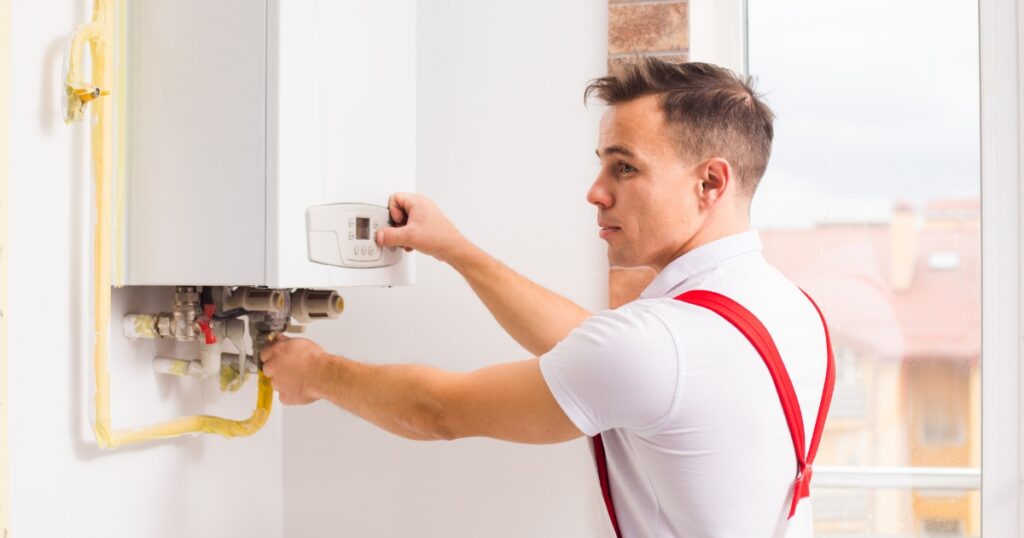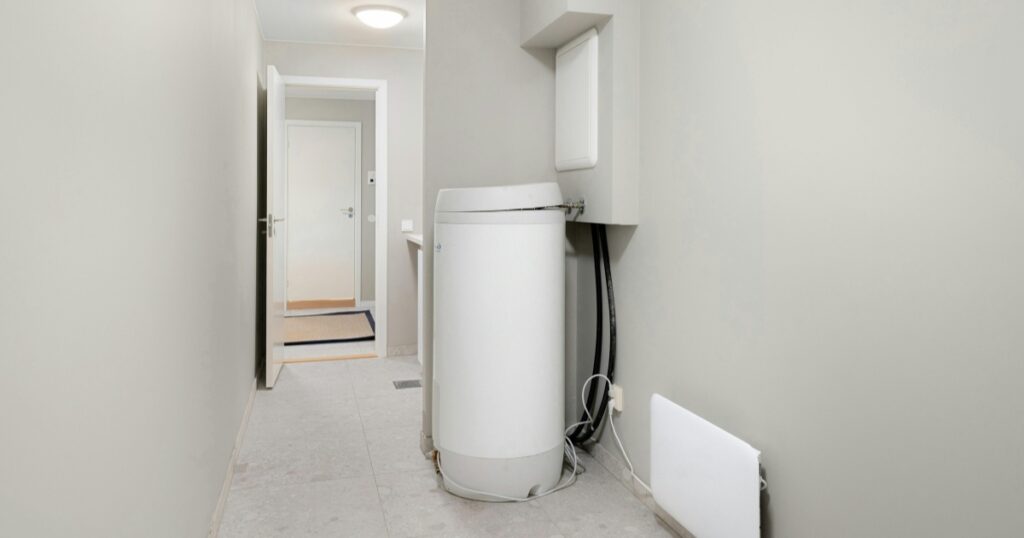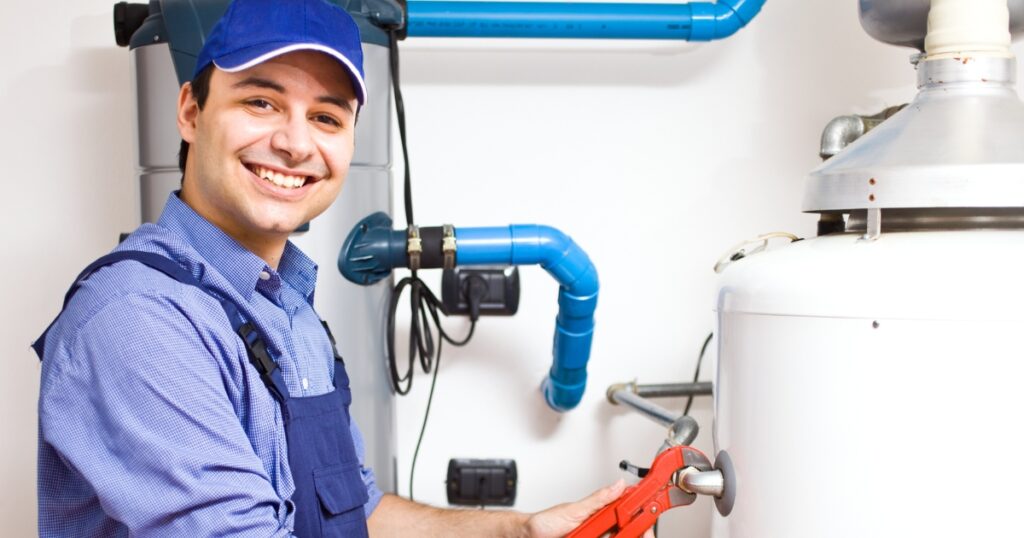We all know the shock to the system that comes from an unexpected icy blast instead of a warm welcoming spray in what should’ve been a soothing shower. It’s as Aussie as Vegemite on toast but far less enjoyable, and we’re not keen on having our serenity disrupted by hot water that’s gone walkabout.
So, we’ve had a good old chinwag about it and uncovered why regular check-ups for your trusty water heater aren’t just recommended – they’re fair dinkum important for keeping your energy costs down (since heating water can chew through nearly 30% of your home’s energy use).
Let us guide you through some top tips to maintain a reliable hot water supply like a well-worn pair of Ugg boots. With simple upkeep, you can ensure those showers are as consistently warm as an arvo sun in Byron Bay, and keep your bills from skyrocketing faster than a cockatoo at dawn.
Key Takeaways
- Water heater maintenance prolongs the system’s lifespan, saving you from costly replacements and unexpected cold showers.
- Consistent upkeep increases efficiency, reducing energy waste and lowering your utility bills month-to-month.
- Safe operation of your hot water system is ensured with regular checks, preventing dangerous hazards like leaks or pressure build-ups.
- Regular maintenance of water heaters adapts to specific local water conditions, preventing mineral build-up that can affect performance.
- By performing simple DIY tasks such as routine inspections and tank flushing, homeowners can avoid professional repair costs while keeping their systems running smoothly.
Benefits of Regular Hot Water Heater Maintenance
Regular water heater maintenance offers a range of benefits, including prolonged lifespan, increased efficiency and safety, consistent hot water supply, and tailored care for your specific water quality.

Prolongs lifespan
Maintenance is key to keeping our water heaters going strong for years. By scheduling annual checkups, we’re taking care of the tiny issues before they grow into big problems.
Think of it like a car service; consistent tune-ups mean fewer breakdowns and a longer road life for your vehicle. It’s the same with our water heaters – regular care prevents corrosion and sediment build-up, which can lead to leaks or system failure if ignored.
Let’s make sure our hot water systems get the attention they deserve. Proper upkeep not only extends their lifespan but also ensures that every shower and sink full of dishes benefits from efficient heating without any unexpected cold surprises.
Keeping those maintenance appointments might be the best way we can show some love to these unsung heroes of household comfort.
Increases efficiency
Regular water heater maintenance increases efficiency by ensuring that the system operates at its best, reducing energy wastage and lowering utility bills. By regularly inspecting and cleaning components like heating elements or burners, you can improve the heat transfer process and keep your water heater running efficiently.
Maintaining optimal temperature settings also contributes to efficiency, preventing unnecessary energy consumption while still delivering reliable hot water when needed. Additionally, routine servicing helps identify potential issues early on, preventing larger problems that could lead to decreased performance and increased energy usage in the long run.
Efficient water heating not only saves money but also reduces environmental impact by consuming less energy. With regular water heater upkeep tailored to your household’s needs, you can enjoy a consistent hot water supply without sacrificing efficiency or increasing costs unnecessarily.
Ensures safety
By keeping your hot water heater well-maintained, you not only increase its efficiency but also ensure the safety of your household. Regular maintenance helps identify and fix potential safety hazards, such as leaks or faulty electrical components.
It also prevents the accumulation of sediment, which can lead to overheating and pressure buildup, reducing the risk of unexpected malfunctions that could pose a danger to your home.
Maintaining your hot water system regularly ensures that it operates safely and reliably, giving you peace of mind knowing that no hidden dangers are lurking within the unit.
Consistency in hot water supply
Consistent hot water supply is crucial for everyday comfort and convenience. By maintaining your water heater regularly, you can ensure a steady flow of hot water whenever you need it.
With routine upkeep, the system’s performance remains reliable, meeting the demands of your household without unexpected interruptions. Additionally, regular maintenance helps to identify and rectify any issues before they lead to disruptions in your hot water supply.
To achieve a consistent hot water supply, it’s important to have a well-maintained system that operates efficiently year-round. This ensures that you always have access to the hot water you need for daily activities and tasks around the house – from showering and washing dishes to doing laundry or cleaning – without worrying about fluctuations or shortages.
Tailored to water quality
To ensure that your water heater operates at its best, it’s important to tailor the maintenance process to the quality of your water supply. Adapting the maintenance schedule and procedures to account for hard or soft water can help prevent mineral buildup and corrosion within the system.
Regular monitoring and adjustments based on your specific water quality can enhance the efficiency and longevity of your water heater, saving you money on repairs and replacements over time.
Adjusting your maintenance routine according to the unique qualities of your water supply is essential in maintaining an efficient hot water system. By acknowledging any challenges posed by hard or soft water, you can take proactive steps toward ensuring optimal performance and energy efficiency while extending the lifespan of your water heater.
The Economics of Hot Water Heater Maintenance
Regular water heater maintenance not only saves you money in the long run but also helps avoid costly emergencies. By investing in routine upkeep, you can ensure that your hot water system operates efficiently and effectively, providing value for money.
Cost savings
By maintaining your water heater regularly, you can save significantly on utility bills. Regular maintenance can help maintain the efficiency of your water heater, reducing energy consumption and lowering your monthly costs.
Additionally, avoiding major breakdowns through routine servicing can prevent expensive emergency repairs, ultimately leading to long-term cost savings.
Ensuring that our hot water systems are consistently checked and serviced not only improves their longevity but also reduces the likelihood of costly replacements down the line. With regular upkeep, we can avoid unnecessary expenditure whilst enjoying an efficiently running hot water system in our homes.
Avoiding emergencies
To avoid emergencies, regular water heater maintenance is essential. By keeping up with routine checks and servicing, potential issues can be identified and resolved before they escalate into costly and inconvenient emergencies.
This proactive approach ensures that your hot water system continues to operate safely and efficiently, providing you with a consistent supply of hot water without unexpected disruptions.
Regular inspections, flushing the tank, and adjusting temperature settings are simple steps that can prevent emergency breakdowns and keep your hot water system running smoothly.
Value for money
Regular water heater maintenance may require upfront costs, but it provides long-term value for money. By investing in annual upkeep, homeowners can avoid unexpected and costly repairs or even premature replacement of the entire system.
This proactive approach not only saves on utility bills through improved energy efficiency but also ensures that the hot water supply remains consistent and reliable. Overall, prioritising regular maintenance is a smart and cost-effective decision for the longevity and optimal performance of your water heater.
Efficient water heating is crucial for reducing utility bills, avoiding emergencies, and maximising the lifespan of your hot water system – all contributing to long-term savings. Therefore, scheduling routine check-ups with plumbing professionals or following DIY maintenance tips are essential steps towards getting the most value out of your investment in a water heater.

DIY Maintenance Tips
Regular inspections and tank flushing are essential for keeping your water heater in optimal condition. It’s also important to regularly check the temperature settings to ensure efficiency.
Regular inspections
Regular inspections are a crucial part of water heater maintenance. They help in identifying any potential issues early on, preventing major problems down the line. Here are some key areas to focus on during regular inspections:
- Check for any signs of leaks around the tank and connections.
- Test the pressure relief valve to ensure it is functioning properly.
- Inspect the heating elements for any corrosion or buildup.
- Examine the anode rod for signs of deterioration and replace it if necessary.
- Assess the temperature and pressure settings to ensure they are at optimal levels.
- Look for any unusual noises or vibrations coming from the water heater.
- Verify that the thermostat is accurately maintaining the desired water temperature.
Tank flushing
To maintain the efficiency of your water heater, it’s important to regularly flush the tank. The process involves draining the tank to remove sediment and debris that can hinder its performance. Here are some steps to take when flushing your water heater:
- Turn off the power or gas supply to the water heater.
- Hook up a garden hose to the drain valve at the bottom of the tank and run it outside or into a floor drain.
- Open a hot water faucet in your home to allow air into the system while draining.
- Open the drain valve and let the water flow out until it runs clear.
- Close the drain valve and disconnect the hose once flushing is complete.
- Turn on the cold – water supply to refill the tank, then turn on a hot water faucet to release any air trapped in the system.
When to Upgrade Your Hot Water System
If your hot water system is reaching an old age, showing signs of decreased efficiency or experiencing rising energy bills, it might be time to consider upgrading your hot water system.
To learn more about the importance of regular water heater maintenance and how it can benefit you, keep reading.
Age of the system
Regular maintenance is crucial, especially as your hot water system ages. As the years go by, wear and tear can lead to decreased efficiency and potential safety hazards. Keeping track of your system’s age allows you to plan for an upgrade before it starts causing problems.
By understanding the signs of aging in your water heater, you can make informed decisions about when it’s time to invest in a newer, more efficient model.
Monitoring the age of your hot water system also helps you stay ahead of any potential issues that could arise due to its gradual deterioration. With regular checks and professional maintenance, you can extend the lifespan of your system and ensure consistent performance for years to come.
Rising energy bills
After considering the age of the system, it’s crucial to keep an eye on rising energy bills. Regular water heater maintenance can help in reducing utility costs significantly. With efficient water heating practices, you can ensure that your energy bills remain manageable and don’t eat into your budget unnecessarily.
By maintaining your water heater regularly, you’ll enjoy reduced utility expenses while also contributing to a more sustainable environment through lower energy consumption.
To avoid unpleasant surprises when paying your monthly bills, it’s essential to take steps towards ensuring that your hot water system is running efficiently and not causing unnecessary spikes in energy costs.
Technological advancements
With the latest technological advancements in hot water systems, there are now more energy-efficient and eco-friendly models available on the market. These new systems offer improved performance and features that help to reduce energy consumption while ensuring a consistent supply of hot water.
By upgrading to a newer model, homeowners can benefit from advanced control settings, smart monitoring capabilities, and enhanced safety features to optimise their hot water usage according to their specific needs and preferences.
In addition, modern water heaters are designed with innovative materials and construction techniques that contribute to longer lifespans and reduced maintenance requirements. These advancements not only save money in the long run but also provide peace of mind knowing that you have a reliable and efficient hot water system in your home.
Seasonal maintenance tips
To maintain your hot water system’s efficiency throughout the year, it’s essential to follow these seasonal maintenance tips:
- Flush the tank to remove sediment buildup and maintain optimal heating performance.
- Check the temperature settings to ensure they’re suitable for the season and energy-efficient.
- Inspect the system for any signs of leaks or corrosion, addressing them promptly to prevent further damage.
- Examine the pressure relief valve for proper functionality and safety compliance.
- Test the water quality and adjust any necessary filtration or treatment systems for a consistent hot water supply.
Maintain Your Hot Water Heater
Regular water heater maintenance is vital for optimal efficiency. It extends the lifespan, ensures safety, and maintains a consistent hot water supply. Upkeep helps in tailoring to the water quality and saves on energy costs as well as avoiding emergencies.
DIY tips like inspections, tank flushing, and temperature settings can significantly contribute towards maintaining your system’s efficiency.






